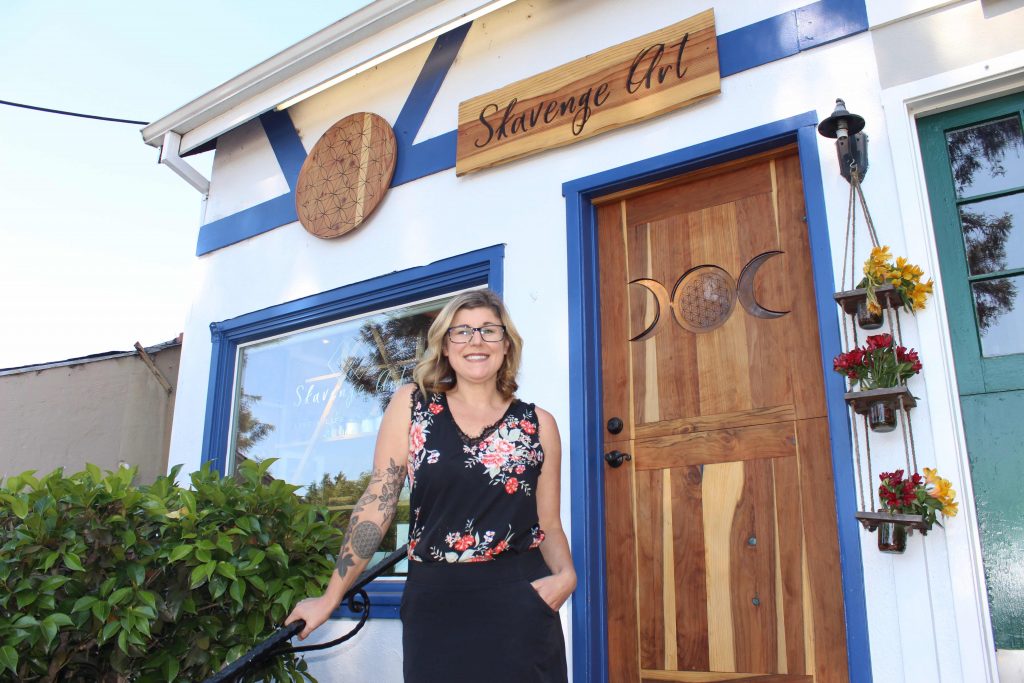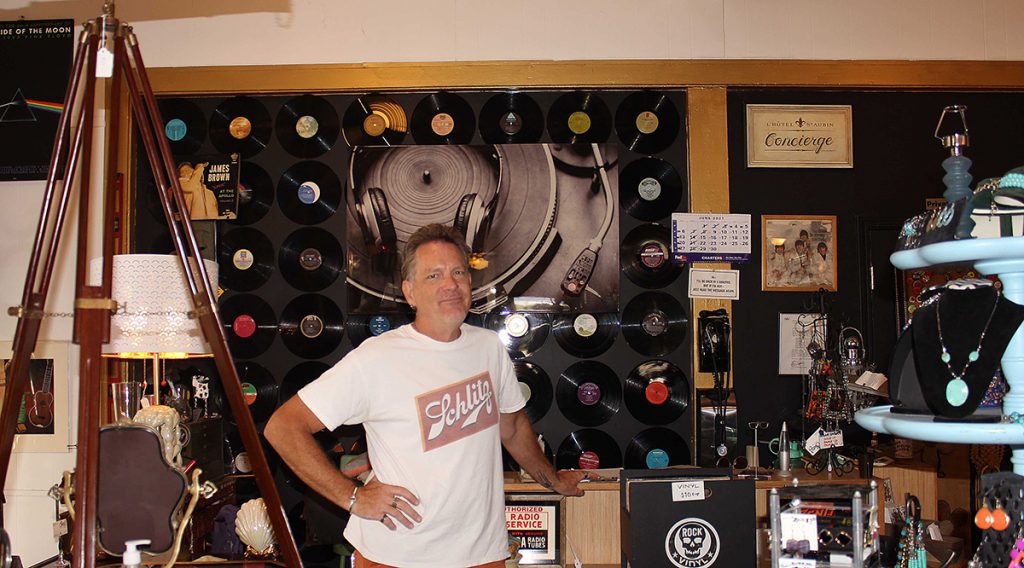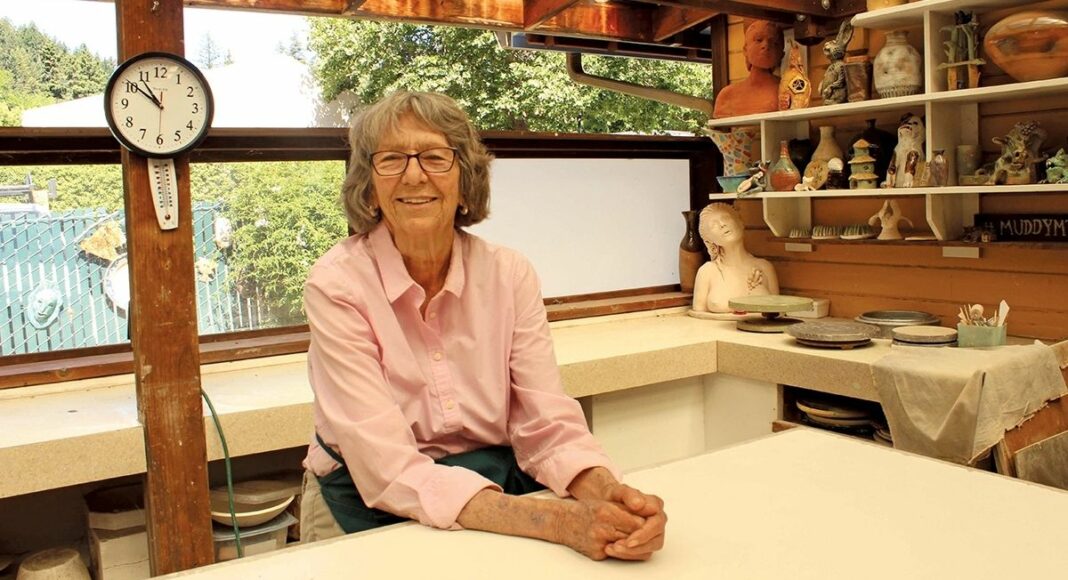While June 15 marked the day California was to return to “business as usual,” according to California Gov. Gavin Newsom, local residents were all over the map as far as how they said they’d react to “opening up.”
On Tuesday, California ditched its system of color-coded restrictions and switched to federal health guidance for public spaces, meaning most social-distancing requirements and other pandemic measures have been lifted.
While some area fitness center employees went out of their way to inform customers they could work out without masks on, other establishments weren’t as eager to change business practices, yet again.
Some restraints will remain—such as restrictions on especially large gatherings, and county health officials are allowed to keep stricter policies in place if they want.
The Press Banner trekked through the Santa Cruz Mountains Tuesday, to take the pulse of how community members feel about the changeover.
Some business reps declined to speak on the record for the story because they didn’t want to release incorrect information about what their rules will end up becoming. One said he was awaiting further guidance from regulators. Others declined to speak for fear of alienating customers who might read a political stance into their decision. Several seemed confused about when changes went into effect. But overall, there was a sense of cautious optimism snaking its way through the Santa Cruz Mountains.
Felton
Tina Walker, 41, has been working at Felton Paint and Hardware her whole life. Her family has run the store for longer than she’s been alive.
“I guess they’re lifting the mask restrictions for people who’ve been vaccinated,” she said, adding she plans to continue wearing one to protect her aging parents. “It doesn’t really change anything for me.”
Her dad, Don, was hospitalized with pneumonia at the height of the pandemic. At first, she was worried he might pick up Covid-19 at the hospital, but her fears lessened when she found out just how isolated the doctors kept him.
“They slam-dunked him right in the hole,” she said. “He didn’t see anybody but the doctors and nurses.”
Their business did surprisingly well over the last year. But while they were allowed to stay open, due to being an essential business, it was a struggle to get product at times, she said. Some apparel is still back-ordered, she adds.
Her mom, Linda, is happy to see restrictions lifting, but still wants to be careful.
“Good luck to everybody—hopefully everybody doesn’t get too excited until we’re really, really safe,” she said. “Because we don’t want people getting sick and going to the hospital.”
Don says he went into the hospital thinking he had Covid-19, found out he had pneumonia, and ended up being diagnosed with congestive heart failure.
“It’s a good excuse not to have to do anything,” he jokes, now.

Skavenge Art owner Selena Zontos, 37, was considering the new reality as she prepared to open the downtown Felton shop where she sells her artwork.
“I don’t know what to do yet,” she said. “I honestly haven’t decided.”
Over the past year, she kicked her online sales efforts into high gear.
“That worked out great,” she said. “If I didn’t do that I wouldn’t have survived.”
She found the energy she put into her digital presence tended to pay off.
Now that more and more people are getting vaccinated and the state is lifting restrictions, she’s confused about how to react. On the one hand, she knows there are fewer requirements she must enforce. On the other, her store is a relatively small space where viral transmission could still be a possibility for unvaccinated customers.
“I suppose I’ll just leave it up to people to do what they feel comfortable doing,” she said, “and I’ll do the same.”
Paul Wright, 74, a resident of the Highway 17/Glenwood Drive area who was hanging out nearby, couldn’t help but chime in with his two cents.
“I’ll wear a mask if people require me to wear a mask,” he said. “I don’t care to rock the boat.”
Even though the novel coronavirus seems to be under control in the U.S., that doesn’t mean it’s not festering elsewhere, he noted.
“It’s still quite virulent in many places,” he said. “England is bad. France is sorta tough.”
Wright sees the big Californian “opening up” as more of an arbitrary date than a genuine reflection of a high-water mark for viral risk.
“Compared to yesterday, it’s about the same,” he said, adding that doesn’t mean he’s overly concerned—after all, he’s been vaccinated. “I’m quite comfortable, actually, around other people.”
Wright says he hopes to see the U.S. start doing more to help the rest of the world.
“This isn’t just our problem,” he said. “This is a worldwide problem.”
The important thing, he says, is to avoid taking the bait from people who don’t always have our best interests at heart—particularly when it comes to health rules.
“What I don’t like is making it a political issue,” he said. “It serves the politicians, but it doesn’t serve the regular people.”
Ben Lomond
At the Santa Cruz Mountains Art Center in Ben Lomond, volunteer Carl Christensen hoisted a giant stylized vagina in place while hanging art for this weekend’s Earth & Fire show opening. The nonprofit space was shuttered more than a year ago, and the ceramic and glass show will be the first in-person event since that happened.
Susan Archibald, a board member, remembers how they had to scuttle the children’s programming last spring, cancel classes, and ask artists to come to collect their work.
“We were totally closed until May,” she said. “What Covid did is made us look and do more things online.”
The center started putting on virtual events and kept its followers in the loop with email updates. To bridge the divide between the virtual and the real, they allowed artists to display some art in their windows. And because they have a large backyard area, they were eventually able to start hosting art classes outdoors.
But the coronavirus struggle has taught them a few things, too. For example, Archibald says the online registration system seems to work quite well.
“We were able to control the number of people that were here,” Archibald said. “Before it was a lot of paper.”
They’d been hoping to get rolling around this time, and were happy to hear the state edict on reopening, so they could confirm their plans, she noted.
“We’re just sort of trying things out to see how they work,” she said, adding they’ll operate, for now, under reduced hours of Friday to Sunday, noon–5pm. “We are opening slowly.”
Boulder Creek
Up in Boulder Creek, Jeff Brough, the owner of SWAG: The eclectic collective, felt the excitement of a new Californian dawn, as he opened his boutique for the day.
“I just took down all my social-distancing and mask signs, because I think it’s technically OK now, right?” he said, adding he remembers the long slog that was the pandemic. “It was slow for a while.”
He says he was lucky to have a lot of different “fingers” in various revenue streams. So, while customers, who couldn’t go out anymore, stopped buying jewelry and clothing, for example, he began doing a tidy business in antique record player repairs.
“Some fingers were sort of dying and falling off the hand,” he said. “Other fingers were growing long fingernails.”

Khris Bigelow, 59, a Bear Creek Road resident of Boulder Creek, says she sees the rule relaxations as positive, but hopes Californians don’t throw their masks away, quite yet.
“I think, when you go in stores, you should still be considerate and wear a mask,” she said. “I’ve been vaccinated, but people don’t know that.”
Scotts Valley
Just because the state is opening up, that doesn’t mean everything is back to normal, says Miranda Leung, who operates Scotts Valley Canton Restaurant with her family.
“If I go out and there’s a lot of people, I’ll wear a mask,” she said. “It helps my allergies.”
She knows everyone will have a different approach to pandemic rule-changes.
“If a customer comes in here, I cannot force them to wear a mask,” she said. “It’s a hard business, especially for the ‘mom and pops.’”
After decades of running a Chinese eatery on 41st Avenue in Santa Cruz, the family decided to open the Scotts Valley location in August 2019. Then the novel coronavirus arrived.
“It’s bad timing,” she said. “But who knows? No one knows this is coming. No one could predict the future.”
Despite several lunch diners chowing down while she spoke, Leung says the family saw business drop off about 60%. And she’s not sure what the future holds.
“Even right now I see business, like, slow,” she said. “I’m just curious what it’s going to be like tomorrow.”














